2023 Dahod Assistant Professorship, International Scholar, Pilot Grant Awards Announced
In August 2008, Shamim Dahod (CGS’76, CAS’78, CAMED’87) and her husband Ashraf gave $10.5M to the School to establish the Shamim and Ashraf Dahod Breast Cancer Research Center, as well as these programs and endowments. Here are the 2023 recipients of the Dahod Assistant Professorship, Dahod International Scholar, and the Dahod Pilot Grant Program Fund.
Dahod Assistant Professorship
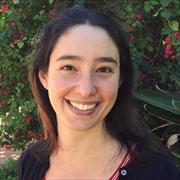 Mollie Barnard, ScD, assistant professor of medicine, joined the Section of Hematology/Oncology and the Slone Epidemiology Center in July 2022. Under the Dahod assistant professorship, she will expand on the epidemiologic breast cancer research she began while at Harvard University and the Huntsman Cancer Institute. Aggressive breast cancer subtypes disproportionately affect Black women, contributing to racial disparities in breast cancer incidence and outcomes. This award will support Dr. Barnard’s efforts to molecularly-characterize breast cancers in the Black Women’s Health Study and will advance her goal of discovering pathways by which chronic inflammatory conditions influence the risk of breast tumor types. Results of her research may lead to a better understanding of reasons for the higher prevalence of aggressive breast cancer subtypes in U.S. Black women.
Mollie Barnard, ScD, assistant professor of medicine, joined the Section of Hematology/Oncology and the Slone Epidemiology Center in July 2022. Under the Dahod assistant professorship, she will expand on the epidemiologic breast cancer research she began while at Harvard University and the Huntsman Cancer Institute. Aggressive breast cancer subtypes disproportionately affect Black women, contributing to racial disparities in breast cancer incidence and outcomes. This award will support Dr. Barnard’s efforts to molecularly-characterize breast cancers in the Black Women’s Health Study and will advance her goal of discovering pathways by which chronic inflammatory conditions influence the risk of breast tumor types. Results of her research may lead to a better understanding of reasons for the higher prevalence of aggressive breast cancer subtypes in U.S. Black women.
Dahod International Scholar
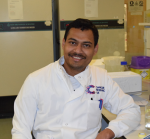 Samir Jana, PhD, a postdoctoral fellow in the laboratory of Dennis Jones, aims to define how breast tumors suppress anti-tumor immunity. Dr. Jana will utilize a novel hormone receptor positive breast cancer model and additional mouse and human breast tumors to investigate how exosomes, small particles released by cancer cells and other cells, inhibit T cell activation essential to the eradication of tumors. By understanding these suppressive mechanisms, Dr. Jana will seek to neutralize signals that cause T cell dysfunction.
Samir Jana, PhD, a postdoctoral fellow in the laboratory of Dennis Jones, aims to define how breast tumors suppress anti-tumor immunity. Dr. Jana will utilize a novel hormone receptor positive breast cancer model and additional mouse and human breast tumors to investigate how exosomes, small particles released by cancer cells and other cells, inhibit T cell activation essential to the eradication of tumors. By understanding these suppressive mechanisms, Dr. Jana will seek to neutralize signals that cause T cell dysfunction.
Dahod Pilot Grant Awardees
A joint instrument grant to Neil Ganem, Rachel Flynn and Hui Feng will cover the cost of the CLARIOstar microplate reader, a fluorescence polarization detector, an accompanying PC, and software to drive the machine, installation and training. This equipment will facilitate the ongoing research of mechanistic study of breast cancer survival pathways in multiple labs in the Dahod Breast Cancer Center and enable the screening of small molecule inhibitors to disrupt a survival pathway in multiple cancers, particularly breast cancer.
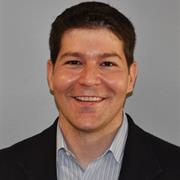 Neil Ganem, PhD, associate professor of pharmacology and medicine, and his lab recently demonstrated that highly-aneuploid breast cancer cells, but not normal non-cancerous cells, are dependent on the mitotic protein KIF18A for growth and survival. Based on this discovery, two companies (Amgen and Volastra) developed KIF18A-specific inhibitors that are currently in Phase I clinical trials in women with late-stage breast and ovarian cancers. The goal of the project funded with this grant is to preemptively discover possible resistance mechanisms that breast cancer cells acquire to evade KIF18A inhibition.
Neil Ganem, PhD, associate professor of pharmacology and medicine, and his lab recently demonstrated that highly-aneuploid breast cancer cells, but not normal non-cancerous cells, are dependent on the mitotic protein KIF18A for growth and survival. Based on this discovery, two companies (Amgen and Volastra) developed KIF18A-specific inhibitors that are currently in Phase I clinical trials in women with late-stage breast and ovarian cancers. The goal of the project funded with this grant is to preemptively discover possible resistance mechanisms that breast cancer cells acquire to evade KIF18A inhibition.
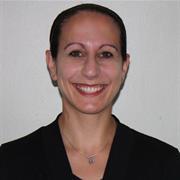 Rachel L. Flynn, PhD, associate professor of pharmacology and medicine, will begin to define the function of SDE2 (silencing defective 2) in the development of cancer. SDE2 is an essential RNA binding protein (RBP) that regulates ribosome biogenesis. Loss of SDE2 leads to ribosomal stress, stabilization of p53, and ultimately, induces cellular senescence. Notably, the SDE2 gene is amplified in 50 percent of metastatic breast cancers highlighting a potential role for SDE2 amplification in tumorigenesis. Thus, we hypothesize that SDE2 functions to bypass the ribosomal stress associated with replicative senescence to promote breast cancer metastasis and invasion.
Rachel L. Flynn, PhD, associate professor of pharmacology and medicine, will begin to define the function of SDE2 (silencing defective 2) in the development of cancer. SDE2 is an essential RNA binding protein (RBP) that regulates ribosome biogenesis. Loss of SDE2 leads to ribosomal stress, stabilization of p53, and ultimately, induces cellular senescence. Notably, the SDE2 gene is amplified in 50 percent of metastatic breast cancers highlighting a potential role for SDE2 amplification in tumorigenesis. Thus, we hypothesize that SDE2 functions to bypass the ribosomal stress associated with replicative senescence to promote breast cancer metastasis and invasion.
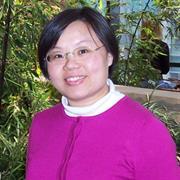 Hui Feng, MD, PhD, associate professor of pharmacology and Medicine, will study a newly identified protein-protein interaction in triple-negative breast cancer (TNBC) cells, which does not appear to operate in non-cancer cells. Understanding the importance of this interaction in TNBC growth and metastatic spread will provide fresh insights into tumor aggressiveness. Mapping out the interaction domains could help identify suitable approaches to dissociate the protein partners and kill TNBC cells.
Hui Feng, MD, PhD, associate professor of pharmacology and Medicine, will study a newly identified protein-protein interaction in triple-negative breast cancer (TNBC) cells, which does not appear to operate in non-cancer cells. Understanding the importance of this interaction in TNBC growth and metastatic spread will provide fresh insights into tumor aggressiveness. Mapping out the interaction domains could help identify suitable approaches to dissociate the protein partners and kill TNBC cells.
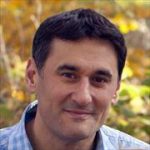 Bob Varelas, PhD, professor of biochemistry, will study how tissue mechanics influence triple negative breast cancer chemotherapy responses. The study will focus on defining mediators of local extracellular matrix heterogeneity within breast cancer tumors and determine how matrix differences influence tissue elasticity and mechanosensitive signaling effectors known to direct chemotherapy evasion. This work will offer insight into why some breast cancer patients fail to respond well to initial therapy and provide knowledge that may direct new clinical directions.
Bob Varelas, PhD, professor of biochemistry, will study how tissue mechanics influence triple negative breast cancer chemotherapy responses. The study will focus on defining mediators of local extracellular matrix heterogeneity within breast cancer tumors and determine how matrix differences influence tissue elasticity and mechanosensitive signaling effectors known to direct chemotherapy evasion. This work will offer insight into why some breast cancer patients fail to respond well to initial therapy and provide knowledge that may direct new clinical directions.
View all posts